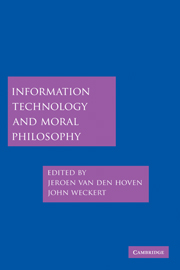Book contents
- Frontmatter
- Contents
- List of Contributors
- Introduction
- 1 Norbert Wiener and the Rise of Information Ethics
- 2 Why We Need Better Ethics for Emerging Technologies
- 3 Information Ethics: Its Nature and Scope
- 4 The Transformation of the Public Sphere: Political Authority, Communicative Freedom, and Internet Publics
- 5 Democracy and the Internet
- 6 The Social Epistemology of Blogging
- 7 Plural Selves and Relational Identity: Intimacy and Privacy Online
- 8 Identity and Information Technology
- 9 Trust, Reliance, and the Internet
- 10 Esteem, Identifiability, and the Internet
- 11 Culture and Global Networks: Hope for a Global Ethics?
- 12 Collective Responsibility and Information and Communication Technology
- 13 Computers as Surrogate Agents
- 14 Moral Philosophy, Information Technology, and Copyright: The Grokster Case
- 15 Information Technology, Privacy, and the Protection of Personal Data
- 16 Embodying Values in Technology: Theory and Practice
- 17 Information Technology Research Ethics
- 18 Distributive Justice and the Value of Information: A (Broadly) Rawlsian Approach
- Select Bibliography
- Index
- References
17 - Information Technology Research Ethics
Published online by Cambridge University Press: 21 July 2009
- Frontmatter
- Contents
- List of Contributors
- Introduction
- 1 Norbert Wiener and the Rise of Information Ethics
- 2 Why We Need Better Ethics for Emerging Technologies
- 3 Information Ethics: Its Nature and Scope
- 4 The Transformation of the Public Sphere: Political Authority, Communicative Freedom, and Internet Publics
- 5 Democracy and the Internet
- 6 The Social Epistemology of Blogging
- 7 Plural Selves and Relational Identity: Intimacy and Privacy Online
- 8 Identity and Information Technology
- 9 Trust, Reliance, and the Internet
- 10 Esteem, Identifiability, and the Internet
- 11 Culture and Global Networks: Hope for a Global Ethics?
- 12 Collective Responsibility and Information and Communication Technology
- 13 Computers as Surrogate Agents
- 14 Moral Philosophy, Information Technology, and Copyright: The Grokster Case
- 15 Information Technology, Privacy, and the Protection of Personal Data
- 16 Embodying Values in Technology: Theory and Practice
- 17 Information Technology Research Ethics
- 18 Distributive Justice and the Value of Information: A (Broadly) Rawlsian Approach
- Select Bibliography
- Index
- References
Summary
INTRODUCTION
Are there moral reasons for restricting information technology research? Let me start the discussion of this question by way of three examples of cases where it has been argued that research in this area should be restricted for ethical reasons.
In his article, ‘Why the future doesn't need us,’ written in response to Kurzweil (1999) and published in Wired, renowned computer scientist Bill Joy warns of the dangers of both the intended and unintended consequences of research into the area of the combinations of genetics, nanotechnology, and robotics (GNR). There is a new kind of risk of accidents, Joy argues, because ‘robots, engineered organisms and nanobots share a dangerous amplifying factor: They can self-replicate.’ Therefore, accidents with these technologies ‘can spawn whole new classes of accidents and abuses. Most dangerously, for the first time, these accidents and abuses are widely within the reach of individuals or small groups…. Thus we have the possibility not just of weapons of mass destruction but of knowledge-enabled mass destruction (KMD), this destructiveness hugely amplified by the power of self-replication’ (Joy 1999, p. 3).
Apart from the specific risks that this kind of research gives rise to, the other aspect of the problem with this research, Joy warns, is that a ‘dream of robotics is that we will gradually replace ourselves with our robotic technology, achieving near immortality by downloading our consciousness.’
- Type
- Chapter
- Information
- Information Technology and Moral Philosophy , pp. 354 - 375Publisher: Cambridge University PressPrint publication year: 2008
References
- 1
- Cited by



